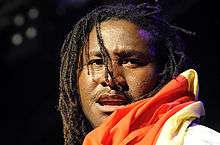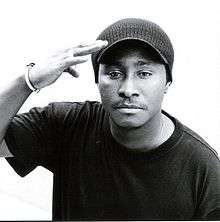Didier Awadi

Didier Awadi is a Senegalese rapper and the most visible figure of Francophone West African Hip Hop. As a founding member of Positive Black Soul (PBS) with Duggy Tee, Awadi toured around the world contributing to the international popularity of Hip Hop Galsen. Awadi works as a solo artist accompanied by his crew PBS Radikal. He participates in the structuring of the musical sector in Senegal through his label, recording studio, and rehearsal space, Studio Sankara. Awadi offers a conscious and revolutionary music strengthened by articulated and rooted messages. His motivation and inspiration stands in the Burkinabé revolutionary, Thomas Sankara's phrase: "Let's dare invent our future!"[1]
Biography

Born on August 11, 1969 in Dakar, Senegal, Didier Awadi is originally from Benin and Cap Verde. In 1984, while Hip Hop was slowly emerging on the Dakar scene, Awadi created the group Syndikat. In 1989, he formed Positive Black Soul with fellow hip hop musician Duggy Tee with the desire of promoting a positive image of Africa. In 1992, PBS is chosen by the French rapper with Senegalese origins, MC Solaar, to be the first part of his show touring throughout France. With a growing popularity, they record in 1994, a first track "Boul Faale" ("Don't worry") in which they denounce the local corruption of the political system. This track became part of their first album, "Salaam" released in 1995 after a European tour and signed under the label, Island Records. During fourteen years, PBS had multiple international collaborations (KRS-One, Mc Solaar, Princess Erika, K-Mel, Kimani Marley, etc.) and toured worldwide while releasing K7 and CD in Senegal and internationally. Throughout his career, as member of PBS and later as solo artist, Awadi articulated a militant and critical discourse in favour of a brighter panafrican future.[2]
In 2001, the two members decided to start a solo careers. A year later, Awadi released his first solo album, “Kaddu Gor” ("Word of Honour") which received the Radio France Internationale (RFI) World Music Award in 2003.[3] After announcing the formation of his new crew, PBS-Radikal with Baay Sooley, Carlou D and Noumounda Cissoko, Awadi signed with Sony Music. In 2005, he released his second solo album, “Un Autre Monde est Possible” (“Another World is Possible”) in which he calls for the emergence of a better society based on equity, fairness, justice and freedom.[4] In 2006, he released “Sunugaal”, a plea for the development of Senegal and against the illegal immigration.[5] In October 2007, Awadi presented his upcoming project, “Presidents of Africa” on the Bataclan (theatre) stage in Paris with artists coming from all over the continent.[1] This fourth album was released in April 2010.[6]
In 1998, Awadi began to contributing to the musical sector of Dakar with the creation of his first home studio, "Taf-Taf Production" ("Quickly" in wolof - but well-done as Awadi stresses) and the first renting of his PA system. In 2001, he produced a one-hour TV show mirroring the local hip hop culture, "Senerap". In 2003, he created a festival dedicated to the hip hop culture, "Senerap International". That same year, "Taf-Taf Production" became "Studio Sankara", a more formal and professional structure of music production actively producing advertising spots. In 2009, as a joint initiative with music professionals and hip hop artists, Awadi organized the first edition of "72H Hip Hop", a three-day event celebrating Hip Hop Galsen through workshops, conferences, performances and exhibitions.
Discography
PBS cassettes released in Senegal between 1994 and 2001:
- Boul Falé
- Boul Falé Bou Bess
- Daw Thiow
- Fo Deuk
- New York / Paris / Dakar
- Wakh Feign
- Révolution 2000
PBS CD released internationally between 1995 and 2001:
- 1995 – Salaam
- 1997 – New York / Paris / Dakar (released in Europe in 2003 only)
- 2001 – Run Cool
Awadi solo albums – from 2002 up to nowadays:
- 2002 – Kaddu Gor
- 2005 – Un Autre Monde est Possible
- 2006 – Sunugaal (released in Europe in 2009)
- 2010 – Presidents of Africa
Distinctions / Affiliations
- 2003 – RFI World music award
- 2004 – Best African rapper – Tamani Awards (Mali)
- 2005 – Chevalier des Arts et des Lettres – France and Senegal
- AURA (United Artists for African Rap) member and actor in the first West African hip hop musical comedy show “The Extraordinary Stories of Poto-Poto Children” in which he represents the soldier-child
Filmography
He was the subject of a film by director Yanick Létourneau, Canada, 2012 Distributed by National Film Board of Canada, WINNER - Critic’s Choice Award - RIDM Festival Montreal 2011
See also
- Hip Hop Galsen
- Positive Black Soul (PBS)
- AURA (United Artists for African Rap)
- Senegalese hip hop
- Music of Senegal
- African hip hop
References
- 1 2 Lemancel, Anne-Laure (October 12, 2007). "Didier Awadi's Guide to African Presidents". Radio France Internationale Musique.
- ↑ "Didier Awadi, Biographie". Radio France Internationale Musique. January 2010.
- ↑ Perrin, Jean-Eric (November 17, 2003). "Didier Awadi, prix RFI musiques du monde 2003". Radio France Internationale Musique.
- ↑ René-Worms, Pierre (September 23, 2005). "The world according to Awadi: Solo Album for the Senegalese Rapper". Radio France Internationale Musique.
- ↑ Squaaly (April 22, 2009). "Didier Awadi, un libre penseur accuse: Un album pour l'Europe". Radio France Internationale Musique.
- ↑ Chabasseur, Eglantine (July 7, 2010). "Chronique Album : Didier Awadi, Présidents d'Afrique". Radio France Internationale Musique.
- Ayoko Mensah, "Because of Age Positive Black Soul. Interview with Didier Awadi,in Hip-Hop Culture. Africultures, 1999, No. 21, p. 17-18
- Stéphane Davet, "Through their Afro hip-hop, rap griots claim the pain of the African people,The World, November 3, 2005
External links
| Wikimedia Commons has media related to Didier Awadi. |